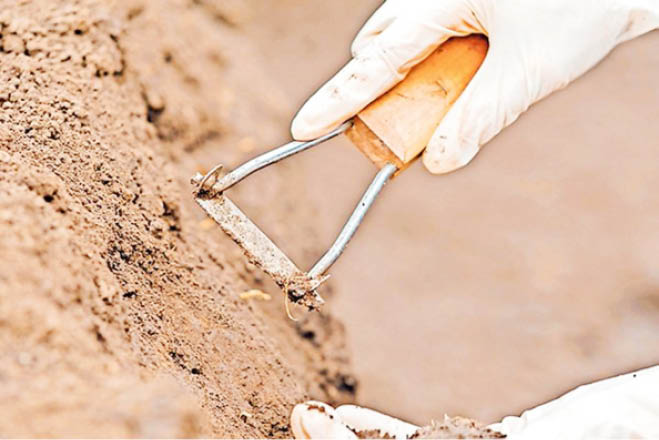World Soil Day: Nigerian scientists warn against salinity
Nigerian soil scientists joined the global community to celebrate World Soil Day on Sunday by calling on governments at federal state and local government levels, organisations, communities and individuals to fight soil salinity in the country. In a press briefing to mark the 2021 edition in Abuja, the President Soil Science Society of Nigeria (SSSN), […]

FILE PHOTO: A researcher collects soil samples for testing
Nigerian soil scientists joined the global community to celebrate World Soil Day on Sunday by calling on governments at federal state and local government levels, organisations, communities and individuals to fight soil salinity in the country.
In a press briefing to mark the 2021 edition in Abuja, the President Soil Science Society of Nigeria (SSSN), Prof Bashiru Raji, said that the world loses an estimated USD27.3 billion annually in crop production due to salinity-induced soil degradation.
- Nnamdi Kanu called me over beatings from Fani-Kayode, says estranged wife
- UNICAL student to represent Nigeria at global start-up contest
Speaking on the theme for 2021 celebration: ‘Halt soil salinization, boost soil productivity’, he said; “soil scientists all over the world are calling on governments, organisations, communities and individuals around the world to commit proactively to maintaining a healthy ecosystem and improving soil health by conscious actions to limit soil salinization.”
The president, who was represented by the Vice President of the association, Prof. Damician Asawalam, described soil salinity as a situation where “salts accumulate in the root zone of crop plants and adversely affects crop growth and yield.
“Salinity is a growing problem around the globe, especially in soils of the semi-arid and arid regions.”
The Nigerian soil scientist warned that; “excess salts in the root zone of crops plants disperse soil aggregates, making it difficult for plant roots to extract water and nutrients from the soil.
“Soil salinization is a major land degradation process that reduces soil fertility and promotes desertification processes in dryland areas.
“The World Bank estimates that soil salinization due to inappropriate irrigation practices affects about 60 million ha of land.
“Salinization accounts for 50% of irrigated land in Africa (Wopereis, 1999); almost 35% of the agricultural land in Egypt (Kim and Sultan, 2002) and is a growing problem in India, Pakistan, China, and Central Asia (Wichelns, 1999),” he noted.
The SSSN called for the implementation of sustainable farming systems adapted to saline and sodic environments while urging farmers to avoid unsustainable practices that can lead to soil salinization.
At its 68” General Assembly, the United Nations designated the 5th of December of every year as World Soil Day; and since its creation in 2014, the SSSN has been joining in the celebration to call for sustainable action on the country’s soil to avoid the problems witnessed by Egypt, India and other countries.
